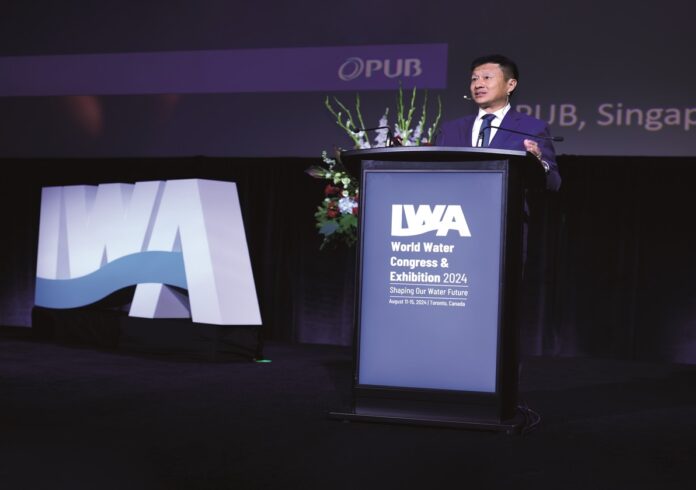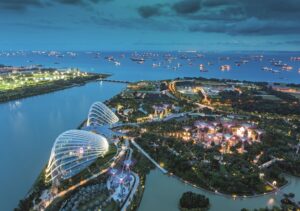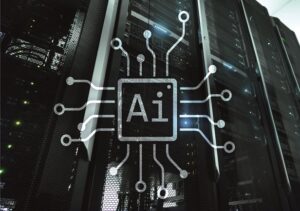
Ong Tze-Ch’in, the new Chief Executive of PUB, Singapore’s national water agency, set out his vision for the utility’s digital future in a keynote at the World Water Congress & Exhibition.
“PUB has come a long way in our journey to ensure clean, safe and sustainable water for Singapore,” said Ong Tze-Ch’in, the new Chief Executive of the country’s national water agency, in his keynote at the World Water Congress & Exhibition in Toronto, Canada, in August. However, there are challenges ahead – specifically with the utility’s remit spanning water supply, reclamation of used water, and protection from storm and coastal flooding. Key challenges include climate change causing increased risk of extended dry periods, more frequent and intense storms, and rising sea levels. In addition, water demand is expected to double by 2065.
Embracing digitalisation
“For us, technology has been, and will continue to be, the key avenue for PUB to address these strategic challenges. We see the opportunity brought about by digitalisation and AI, and its potential for automating PUB’s operational processes, improving productivity, enhancing situational awareness, and strengthening decision-making.”
PUB is already on this journey, having set out its Smart PUB Roadmap in 2018. “It outlines the systematic development of digital solutions and smart technologies, and the deployment of these across our water loop and business units,” said Ong. “When we first started, we focused on identifying and implementing digital technologies. We soon realised that this was not the best approach. We needed more than just technology alone. We had to look at transforming our business processes from end to end.”
Here he pointed to PUB’s IWMS – its intelligent water management system. “It’s our enterprise command control and communication system,” he explained. “It supports our central operations and incident management by integrating and analysing data from multiple sources. It provides us with real time situational awareness across the water loop.”

garden and Marina Barrage © iStock.com / Kanuman
Implementation of the IWMS involved customising PUB’s IT system and adjusting the organisation’s operational processes to make the most of efficiencies and opportunities. Aided by machine learning, PUB can predict water demand using historic consumption patterns for weekdays and weekends, and based on the weather. “This helps to guide our operational planning by matching our water production with our forecast demand,” said Ong.
He noted the importance of having adequate and good quality data. This is captured by a large number of sensors and CCTV cameras, providing the data for PUB to build digital twins and simulation models for its drainage, sewerage and water networks.
“Layering on data analytics and machine learning capabilities has provided useful insights for us,” said Ong. “We can now respond more quickly to issues such as water leakages, sewer chokes and floods. By reviewing the root causes of our operational issues, we can simulate future scenarios and test out plans, and this allows us to better optimise our resources and reduce costs.”
Ambitions for a smart and AI-enabled PUB
PUB is well down the road with this roadmap, but Ong has ambitions to escalate this progress. “As PUB’s new Chief Executive, I have decided that I want to double down on our digitalisation efforts and move towards a smart and AI-enabled PUB. We will continue to identify common business functions across departments and explore opportunities for new enterprise digital solutions.”
With more than 5000 CCTV cameras already in place across the organisation, one example that PUB is working on is a video masterplan. These cameras monitor operations, security and activities at PUB’s plants, installations and water bodies. “Imagine the value we can unlock if all these video feeds and alerts can be consolidated. And this is what our new centralised video management system does. It’s a single source of truth of video data across PUB.”
“PUB is a key climate adaptation agency for Singapore”
Ong explained that it is also a one stop application for incident management. “This reduces the time and effort that we need to identify a major incident and facilitates the sharing of information for decision-making,” he said. “With this single source of truth, the opportunity to layer on video analytics offers us great possibilities. We will now be better positioned to conduct operations centrally from our operations centre, with eyes looking across the entire water loop. You can just imagine the view that this will afford us when the system is fully operational.”
There is huge interest in the progress of generative AI, he said. “From PUB’s perspective, we see AI as transformative and game-changing, but we are taking it cautiously.” This has resulted in a focus on machine learning and deep learning.
“One clear area where PUB intends to move into AI in a big way is maintenance,” said Ong. Many assets are currently under a preventive maintenance regime. This is based on historical averages of failure rates and typically includes a built-in buffer. “This means that we’re likely to service or replace an asset too early. This is inefficient and adds cost. Our goal is to move towards a performance based predictive maintenance regime, one that uses analytics and high frequency data to predict the reliability of equipment.
“At our plants, we have started to implement condition monitoring for critical reservoir feed pumps. Upon early signs of anomalies, our maintenance crew will be alerted to take action before pumps fail. We are taking this further by developing machine learning modules to establish baseline performance of our assets. And, from there, we intend to use these models to predict the risk of failure. This will help us to optimise how we maintain and replace our asset base, which will continue to expand as our water demand grows.”
Another application area is in the use of drones and video analytics. First joking that this is used to target illegal fishing, Ong explained that the drones are used primarily for reservoir management. “We use it to check on aquatic plant growth in our reservoirs. We also use it to count vessels in the reservoirs. This technology has helped us to fulfil tasks that our scarce manpower simply cannot take on.”
The other area he highlighted was in relation to climate change. “With its mission to address coastal and flood resilience, PUB is a key climate adaptation agency for Singapore, and data and AI presents a huge opportunity for us to overcome our climate change challenges.”
A rainfall monitoring and prediction system has been in place since 2018, providing early rainfall warnings and indicating where flash floods could potentially happen. “We are now exploring machine learning models to forecast near-term drainage levels using data from radars, water level sensors and rain gauges. Today, we can monitor our reservoir and drainage operations in real time at our joint operations centre by bringing together the rainfall maps, CCTV cameras, and water level sensors. We have a system that can predict locations where heavy rain is expected and deploy our quick response teams early to flooding sites.”
“In reaching for the stars, one might just reach the moon”

A coming step is the development of an integrated coastal inland flood model – the next milestone for PUB. “We are building a model that can simulate coastal and inland flooding,” Ong said. “This provides us with a combined flood risk assessment of Singapore’s low-lying areas and supports planning for long-term coastal protection measures.” He also mentioned plans for a new function to forecast storm surges. “We hope to enhance the model, to enhance our flood operations capabilities and emergency response planning under extreme coastal conditions.”
The people dimension
These plans for a smart and AI-enabled PUB have a human dimension, too. “To succeed in this journey, we need our people to come along,” he said. “We need to reskill and upskill our workforce.”
Ong previously worked on SkillsFuture Singapore, which he describes as Singapore’s lifelong learning movement. “We are trying to do the same thing,” he explained. “We are working very hard on what I call SkillsFuture at PUB.
“As new technologies are deployed, as business processes are changed, we need our staff to be able to keep up and to exploit these changes,” he said. With this in mind, PUB has put in place training courses to raise digital and AI competencies, as well as broader activity to give staff opportunities to learn new skills and build new networks.
There is another line of action alongside this, which he described as the hardest of all. “We are working to shift our people’s mindsets – for them to embrace the spirit of lifelong learning, to have the intellectual curiosity to pick up new skills and new knowledge, work in new environments and embrace new teammates.”
He made clear that digitalisation offers huge potential, especially with the advent of AI, and that this is needed given the prospects of climate change, increased water demand, and workforce challenges. “In reaching for the stars, one might just reach the moon. For PUB, we simply have to give this moonshot a chance – it’s the only way we can meet our triple challenges.” •







